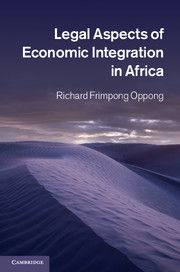Book contents
- Frontmatter
- Contents
- Tables
- Acknowledgements
- Table of treaties
- Table of cases (international/regional courts)
- Table of cases (national courts)
- Abbreviations
- Introduction
- 1 Africa's economic integration – an introductory overview
- 2 Legal framework for managing relational issues
- 3 The AU, AEC and regional economic communities
- 4 Community–state relations in Africa's economic integration
- 5 Relational issues before the community courts
- 6 AU/AEC institutions and the enforcement of community law
- 7 Implementing community law in African states
- 8 Inter-institutional relations: public–private international law dimensions
- 9 Interstate relations, economic transactions and private international law
- 10 Conclusion
- Bibliography
- Index
4 - Community–state relations in Africa's economic integration
Published online by Cambridge University Press: 05 July 2011
- Frontmatter
- Contents
- Tables
- Acknowledgements
- Table of treaties
- Table of cases (international/regional courts)
- Table of cases (national courts)
- Abbreviations
- Introduction
- 1 Africa's economic integration – an introductory overview
- 2 Legal framework for managing relational issues
- 3 The AU, AEC and regional economic communities
- 4 Community–state relations in Africa's economic integration
- 5 Relational issues before the community courts
- 6 AU/AEC institutions and the enforcement of community law
- 7 Implementing community law in African states
- 8 Inter-institutional relations: public–private international law dimensions
- 9 Interstate relations, economic transactions and private international law
- 10 Conclusion
- Bibliography
- Index
Summary
From a legal perspective, and beyond issues on the relationship among the African Economic Community (AEC), African Union (AU) and Africa's Regional Economic Communities (RECs), the approach to economic integration adopted by the AEC raises other important issues, which are yet to be addressed in practice and in the discourse on Africa's integration. These include the legal status of community institutions and law within member states’ legal systems, the effectiveness of community institutions as enforcers of community law, the role of the community courts as arbiters of conflicts between and among the constituent legal systems, and the coordination and harmonization of the laws of member states. These issues form part of the more profound and broader problem that bedevils all economic integration processes: what are, or should be, the legal relations between the economic community and the member states? Economic integration results in a juxtaposition of legal systems. These legal systems include that of the organization responsible for the integration process (community), those of the member states and regional organizations, and the international legal system, which often provides the legal basis for the integration initiative. In addition to issues of management, organization and competition, this juxtaposition of legal systems creates legal problems and raises many questions: What is the relation between community and national legal systems? What is the status of national law in the community legal system and vice versa? What are the rules for resolving conflicts of laws between and among these legal systems? Which institution is responsible for resolving such conflicts?
- Type
- Chapter
- Information
- Legal Aspects of Economic Integration in Africa , pp. 82 - 116Publisher: Cambridge University PressPrint publication year: 2011



